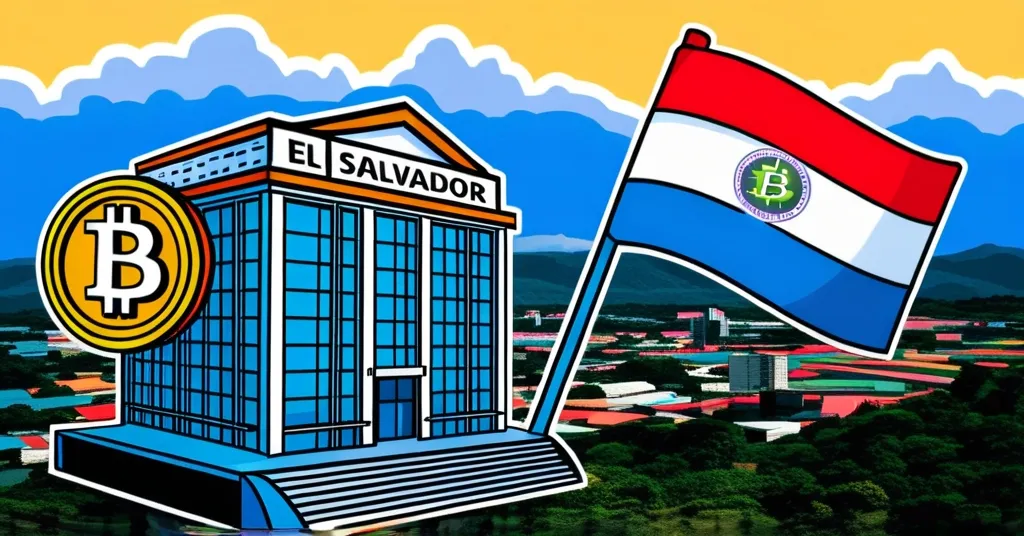Bitfinex Derivatives Moves to El Salvador, Embracing Crypto Hub Ambitions

Bitfinex Derivatives Relocates to El Salvador: A Bold Step into the Crypto Hub
Bitfinex Derivatives, a subsidiary of the renowned cryptocurrency exchange Bitfinex, has made a strategic move to El Salvador after securing a Digital Asset Service Providers (DASP) license. This relocation aligns with El Salvador’s ambitions to become a leading cryptocurrency hub in Latin America, despite facing challenges like the recent failure of the Hilton hotel tokenization project.
- Bitfinex Derivatives relocates to El Salvador
- El Salvador’s pro-crypto legislation
- Challenges of tokenization projects
- Potential and risks of El Salvador’s crypto strategy
Bitfinex Derivatives, a key player in the crypto world, has recently obtained its second DASP license. This license, which allows companies to offer services related to digital assets, marks a significant shift from the Seychelles to El Salvador. This move isn’t just about changing locations; it’s a strategic play to leverage El Salvador’s crypto-friendly environment. El Salvador is rolling out the red carpet for crypto companies, and Bitfinex is ready to take advantage of this opportunity.
Paolo Ardoino, CTO of Bitfinex Derivatives, underscored the significance of this transition, stating,
“This critical transition represents a defining moment for Bitfinex Derivatives and highlights El Salvador’s rise as a global financial hub.”
His words echo the optimism surrounding El Salvador’s potential as a crypto hub, yet it’s important to remember that even the most promising ventures can face setbacks.
El Salvador’s commitment to embracing digital assets is reflected in its legislative efforts. In January 2023, the country passed the Digital Assets Securities Law, which facilitates the issuance and secondary trading of digital assets. This law stands out because it specifically caters to the needs of the crypto industry, setting El Salvador apart from other nations. It’s this kind of tailored legislation that has attracted companies like Bitfinex, eager to provide financial services and consultations in a crypto-friendly environment.
However, the journey hasn’t been without its bumps. Bitfinex Securities, another division of Bitfinex, attempted to fund a Hilton hotel project through tokenization. Tokenization is the process of turning assets into digital tokens on a blockchain, which can then be traded like stocks. Unfortunately, the Hilton project aimed to raise funds for a 4,500 square meter hotel but couldn’t meet its $500,000 goal, leading to refunds for investors in July of the previous year. The Hilton project was a total flop, showing that even in crypto-friendly El Salvador, not everything turns to gold. Despite this, there’s still hope. Jesse Knutson, Head of Operations at Bitfinex Securities, expressed optimism about restructuring and relaunching the project, indicating that investor feedback showed strong interest.
The potential of tokenization in El Salvador remains high, but it’s not without challenges. Experts like Ralf Kubli from The Casper Association advocate for industry standards like the Algorithmic Contract Types Unified Standards (ACTUS) to enhance the stability and attractiveness of tokenized financial instruments. Without these standards, the tokenized debt market might struggle to reach its full potential.
El Salvador’s embrace of Bitcoin as legal tender has sparked both enthusiasm and caution. On one hand, it could improve international remittances by reducing costs and increasing speed, aligning with the country’s economic goals. On the other hand, Bitcoin’s volatility raises concerns about monetary policy autonomy. The recent $1.4 billion IMF loan, which led to some restrictions on domestic Bitcoin activities, highlights the delicate balance El Salvador must maintain between fostering innovation and ensuring financial stability. While El Salvador’s crypto ambitions are promising, the road ahead is filled with potholes that need careful navigation.
The global trend towards recognizing digital assets as legitimate financial instruments continues to evolve, with El Salvador leading the charge. Bitfinex Derivatives’ relocation is a vote of confidence in El Salvador’s crypto-friendly policies and a testament to the country’s potential to drive fintech innovation in Latin America. While the road ahead may be fraught with challenges, the promise of a thriving digital asset ecosystem in El Salvador remains strong. As Bitfinex and other players continue to explore opportunities in this emerging market, the world of cryptocurrency watches with keen interest, ready to learn from both the successes and the failures of this bold experiment.
Did you know? El Salvador was the first country to make Bitcoin legal tender, leading to a surge in crypto ATMs.
Key Takeaways and Questions
- What prompted Bitfinex Derivatives to move to El Salvador?
Bitfinex Derivatives moved to El Salvador to capitalize on the country’s pro-crypto legislation and to leverage its DASP license for offering financial services.
- What steps has El Salvador taken to become a crypto hub?
El Salvador has accepted Bitcoin as legal tender and introduced the Digital Assets Securities Law to facilitate token issuance and fundraising.
- What was the outcome of Bitfinex Securities’ Hilton hotel tokenization project in El Salvador?
The project failed to raise the minimum required funds and was subsequently canceled, with investors receiving refunds.
- How does the relocation of Bitfinex Derivatives align with El Salvador’s financial goals?
The relocation aligns with El Salvador’s goal of becoming a financial hub in Latin America by attracting cryptocurrency businesses and fostering fintech innovation.
- What challenges do crypto-related initiatives face in El Salvador?
As demonstrated by the Hilton hotel project, challenges include meeting fundraising goals and ensuring investor confidence in new tokenization initiatives.
- What are the potential risks of El Salvador’s crypto strategy?
Potential risks include increased financial instability due to Bitcoin’s volatility and challenges in balancing innovation with financial stability.



